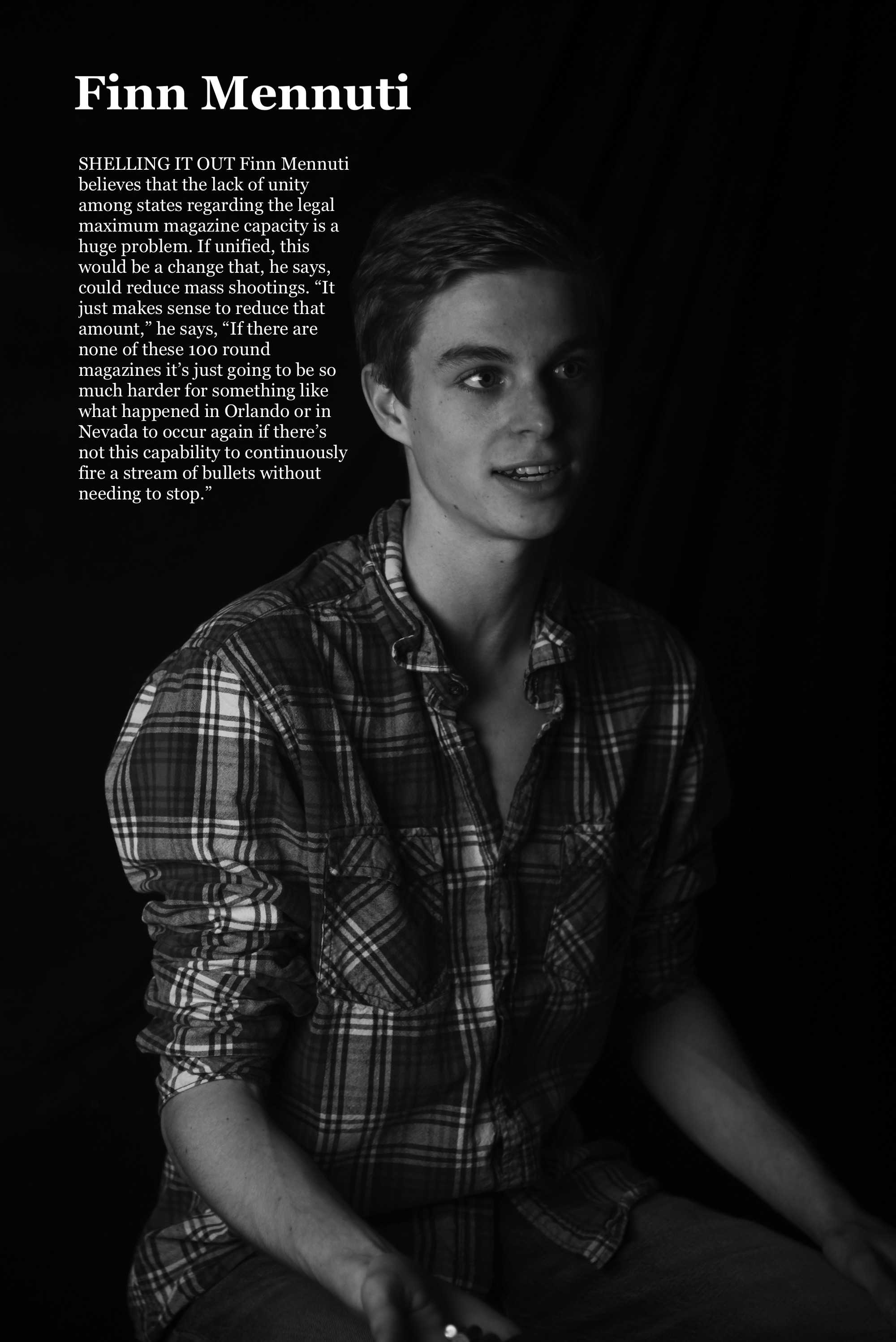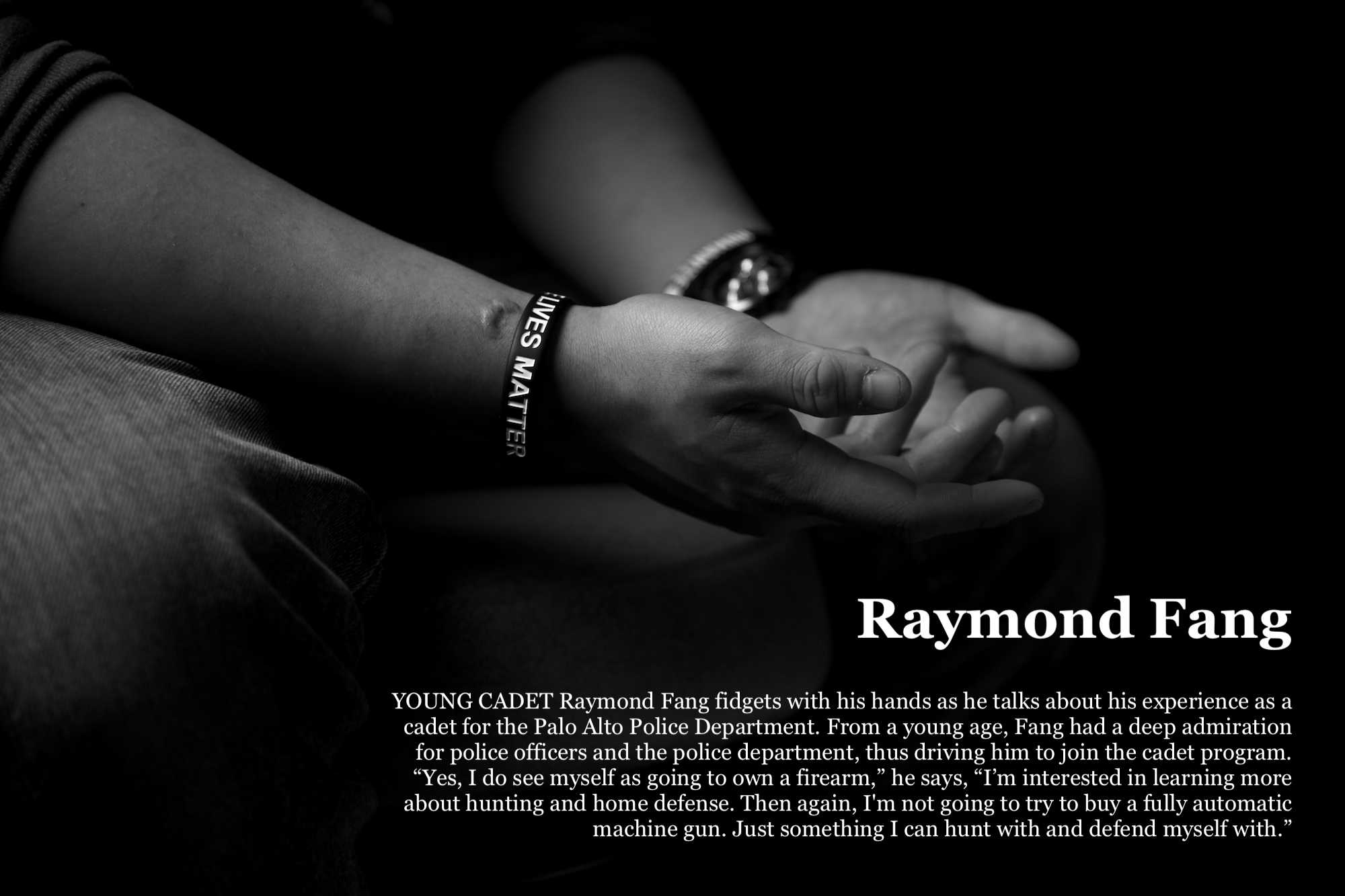Varun Dutta takes a moment to think through the list of all the guns he’s worked with during his time in a 10-week U.S. Army summer training program. The Palo Alto High School senior frowns slightly, his hands folded in his lap as the clock ticks in the portrait studio. After a few concentrated seconds of deliberation, he answers: He has worked with machine guns such as the M240 and M249, rifles including the M4 and M214, and the smoothbore AT-4. Dutta began working with firearms at age 12 as a Boy Scout, placing him in the minority of Paly students who have experience with such weapons.
Though only eight percent of Paly students have used firearms before, many more participated in the National School Walkout protesting gun violence and calling for gun control. In response to the February mass shooting at Marjory Stoneman Douglas High School in Parkland, Florida, the survivors, students and other civilians have come together to advocate for legislative change.
However, in the midst of heavy debates, hand-drawn posters and classroom discussions, are Palo Alto’s gun-owning families, outliers in the city, who often feel they are left out of the conversation about gun rights and gun violence in the Bay Area. Verde spoke with four Paly students with experience in handling guns to hear their perspectives.

Despite growing up in the Bay Area, Finn Mennuti has had more exposure to firearms than the average Silicon Valley teen. At age 13 he shot his first gun.
“For my 13th birthday I got a BB gun and, after that, I went to a shooting class for the first time and took an NRA class so that I would become certified,” Mennuti says.
As he matured, Mennuti’s interest in firearms, often a way to bond with his grandad, grew. However, as someone who classifies himself as an Independent, Mennuti says he supports numerous changes to legislation that, he believes, will reduce gun violence.
“I think that concealed carry reciprocity would be something interesting to see in the states. [It’s] where, if you have a concealed carry permit, it applies in every state,” he says. “The only way I would want to see this instituted is if these concealed carry permits are held to a standard higher than what they are currently.”
“Mennuti feels that instituting concealed carry reciprocity along with stricter gun laws would please both the NRA and those advocating for gun reform.”
Mennuti feels that instituting concealed carry reciprocity along with stricter gun laws would please both the NRA and those advocating for gun reform.
“I think that it’s kind of a win-win,” he says.
Mennuti also strongly believes that students feeling unsafe at school is a huge problem, especially on Paly’s open campus.
“Right now there is no fence. I mean, we have that,” he says, pointing towards the chain-link fence bordering Embarcadero Road. “But there is no real protection for us.”
In response to this, Mennuti would like to see more meaningful defense mechanisms put in place around schools. However, he says that propositions such as arming teachers, as President Trump suggested, would not work.
“We shouldn’t be hiring educators based on their military background,” he says. “We don’t want to be determining who’s gonna teach AP bio by walking into a shooting range, picking out the best shot, and saying ‘Ok, you’re AP bio, you, you can be elementary school.’”

Unlike Mennuti, senior Raymond Fang’s interest in firearms wasn’t encouraged by his family. In fact, he says he grew up in a liberal household that saw gun ownership as unnecessary. But since becoming a cadet with the Palo Alto Police Department at age 15, and later transferring to the Redwood City Police Department, he’s gained a familiarity and expertise with firearms that comes with the job.
“I got into it [law enforcement] because I always had an admiration for police officers and the police department,” Fang says. “I ended up falling in love with it. It’s a good way to fill up my time.”
In his role as a cadet, he says he’s received “extensive training” with firearms, and used to occasionally go shooting with a fellow cadet. He’s also attended a number of military boot camps, where he took marksmanship courses.
To Fang, the right to bear arms is as important pragmatically as it is ideologically. Training with firearms now will be valuable to him later, as a law enforcement officer, he explains. But he also sees the Second Amendment as a vital part of Americans’ personal liberty and security.
“It means the right to be able to defend ourselves with firearms,” Fang says, “being able to effectively combat any kind of oppressive force, such as the government or a criminal element, from harming us.”
“It [the Second Amendment] means the right to be able to defend ourselves with firearms. Being able to effectively combat any kind of oppressive force, such as the government or a criminal element, from harming us.”
— senior Raymond Fang
Like many Paly students, Fang was horrified by the Parkland shooting, and sees gun violence as a serious problem. But unlike much of the student body, he doesn’t see guns as the root cause.
“I feel like there definitely is an issue with the availability of firearms,” Fang says. “But also, there’s an argument for how mental illness is treated, and the availability of prescription medications.”
To Fang, the issue is too complicated to reduce to one main factor, and he supports a variety of different approaches to solving it — for example, installing armed guards and metal detectors around schools.
On some aspects of the gun control debate, Fang sees eye-to-eye with the majority of Paly students. He is in favor of continuing the current federal ban on fully automatic weapons, keeping the legal age to purchase a handgun at 21 in California, and a better societal response to mental health issues. But when it comes to limiting access to firearms overall, Fang says that the cost to law-abiding citizens is too high.
“Basing on what I know in California,” he says, “I feel like it’s gotten extremely hard to own any kind of firearm that is effective in defending your life.”
Asked whether he wants Paly students to know anything about gun owners, Fang answers quickly.
“I want people to know that gun owners aren’t these people who wave around American flags or confederate flags, shooting in the air while driving their Ford,” he says. “[They] want to have that extra step in being able to defend themselves, their family, their friends.”

Annie Niethammer is a Paly junior during the weekdays and a duck hunter on the weekends.
“We’re a duck hunting family,” Niethammer says. “So I pretty much grew up having guns and … I would say it doesn’t scare me to have guns in my house whatsoever.”
Like Mennuti, Niethammer gets much of her comfort with firearms from her family. Whether it’s duck hunting as a group or hunting turkeys in a family friend’s vineyard, the Niethammers spend much of their free time bonding outdoors — and guns are an inextricable part of the equation.
At home, her family keeps all their guns locked in the garage outside the house. Her father keeps the key hidden from everyone — even Niethammer.
“They [my parents] are very protective about it, very serious about it,” Niethammer says.
The one firearm the family has in their home is a handgun, which Niethammer says is for self defense.
“You never know who can come into your house and they could have a gun. They could shoot you.”
— junior Annie Niethammer
“You never know who can come into your house and they could have a gun,” Niethammer says. “They could shoot you.”
She says she’s never received an overtly negative reaction from people who found out her family owns guns. But acquaintances commonly react with surprise, and she’s learned to censor herself a little when the gun debate comes up in conversation.
“Just being around in this school and people talking about [being] anti-guns,” Niethammer says. “I guess it’s not easy for me to speak up about it, because I know the majority of people are like that. So I don’t want to start an argument or anything like that. They’re entitled to their opinion and I’m entitled to mine.”
For Niethammer, coming from a family that owns guns is part of a larger outdoorsy identity, the type that’s rare in a place as urbanized as Palo Alto. However, the stereotypes don’t bother her.
“We’re proud to stand with our family and stand true to who we are [and] what we believe,” Niethammer says.
Read more of our #enoughisenough cover stories
Up in arms: leaders of walkout hope to galvanize student body
Unloading Stereotypes: Students with guns speak on shootings
Palo Alto High School statistics and opinion on gun control



